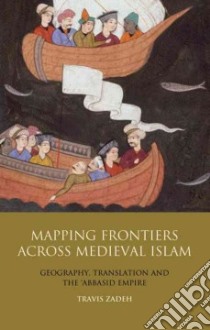- Libreria
- >
- Libri in lingua
- >
- Religione e spiritualità
- >
- Religione e fede
Mapping Frontiers Across Medieval Islam - 9781848854512
Un libro in lingua di Travis Zadeh edito da Tauris Academic Studies, 2011
- € 130.70
- Il prezzo è variabile in funzione del cambio della valuta d’origine
The 'Abbasid caliph al-Wathiq bi'llah dreamt that the wall built by Alexander the Great against the apocalyptic nations of Gog and Magog had burst open. In 842, he sent an embassy headed by Sallam the Interpreter to discover the status of the fabled barrier mentioned in the Qur'an. So goes the account of the mission as it first appears in the descriptive geography of the Persian courtier Ibn Khurradadhbih.
Here Travis Zadeh explores the Syriac, Persian and Arabic antecedents of the mission, along with the running debates, which start in the ninth century, over the veracity of the account. Many early Orientalists rejected the adventure as an example of the 'Mohammedan' tendency to believe in superstitions. In the course of the nineteenth century, however, several scholars, informed by positivist constructions of history, turned to this adventure as a historical mission, proposing, in turn, an array of hypotheses on the actual route taken by the caliphal emissary, ranging from the Ural Mountains to the Wall of China. Nonetheless, relatively little attention has been given to how the mission to Alexander's wall relates to the broader historical context of 'Abbasid society and forms part of a larger pattern of projecting imperial power. Likewise, modern scholars have tended to overlook the divergent manuscript recensions, which detail conflicting accounts of the adventure. Zadeh re-evaluates the reception history of al-Wathiq's mission, as manifest in the codicological evidence and in early Arabic and Persian descriptive geographies, and, by doing so, details how the adventure to the wall of Gog and Magog forms part of a larger pattern of inscribing geographical discourse on marvels and monsters within Islamic salvation history.
By tracing the construction of frontiers between civilization and hostile or unknown territories and forces, Zadeh offers a nuanced understanding of the relationship between politics, religion and geography in this key period of Islamic history. Mapping Frontiers across Medieval Islam addresses questions of writing, translation and power, and is essential reading for all those interested in Islamic studies, the 'Abbasid empire and its politics, geography and religion, Arabic and Persian literature, and European Orientalism.
Informazioni bibliografiche
- Titolo del Libro in lingua: Mapping Frontiers Across Medieval Islam
- Sottotitolo: Geography, Translation, and the 'Abbasid Empire
- Lingua: English
- Autore: Travis Zadeh
- Editore: Tauris Academic Studies
- Collana: Tauris Academic Studies (Hardcover)
- Data di Pubblicazione: 15 Agosto '11
- Genere: RELIGION
- Pagine: 315
- ISBN-10: 184885451X
- EAN-13: 9781848854512


